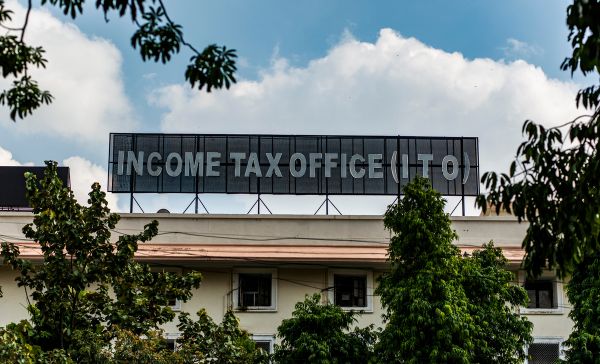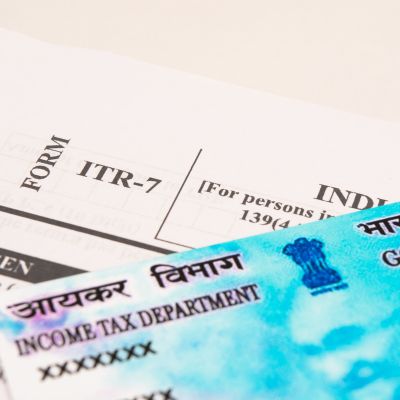Being a homeowner has a lot of benefits, but it is not easy to become one. Owning a house gives one a lifelong sense of security, and as the price of a property increases year after year- it acts as a great source of investment. A home loan is a great method of buying a home. To make home loans more lucrative and beneficial, the government offers various tax rebates and deductions on the said loan amount. The 4 sections under the IT Act that deal with tax rebate claims and deductions on home loans are – Section 24 of the Income Tax Act, Section 80C, Section 80EE and Section 80EEA. This article deals in detail with deduction under Section 24 of the Income Tax Act, interest on housing loans under Section 24, pre-construction interest deduction under Section 24, and many other topics. To know in detail about Section 24 of Income-tax, read further.

Things we covered for you
What are Tax Deductions?

A tax deduction reduces your tax payments and lowers your tax bill. The amount of the tax deduction is deducted from your income, lowering your taxable income. Your tax bill will be lower if your taxable income is low. To help people avail of manageable home loans, the government offers various deductions on home loans as per Section 24. Tax payment comes hand in hand with ownership of any property. This is why, even if the unit is vacant, an individual’s income from house property is taxed based on its ability to earn a certain amount in rent. Tax deductions are also a boost for people to avail of home loans and are a kickstart to one’s dream of having their own property. Interest on home loans now is as low as 6.65% p.a. + Sec 24 of Income Tax offers various deductions = a great deal for your property.
Read: All You Need to Know About NMMC Property Tax
Tax Benefits on Home Loans in 2021
Under some of the provisions of the Income Tax Act 1961, homebuyers receive income tax benefits on both the principal and interest components of their home loan.
| Tax deductions permitted on home loans + Stamp duty registration fee | |
| Mentioned Section in the Income Tax law | Section 80C |
| Tax Rebate (Upper Limit) | Rs 1.50 lakhs per annum |
| Tax Rebate (Upper Limit) for senior citizens | Rs 2 lakhs per annum |
| Tax Deductions permitted on home loan Interest | |
| Mentioned Section in the Income Tax law | Section 24, Section 80EE, Section 80EEA |
| Tax Rebate (Upper Limit) | Up to Rs 3.50 lakhs per annum |
| Tax Rebate (Upper Limit) for senior citizens | Up to Rs 4.50 lakhs per annum |
Deductions Under Section 24
Section 24 of the Income Tax Act deductions are available for property construction and property purchase. Section 24 of the Income Tax Act permits house owners’ deductions of up to Rs 2 lakh for yearly interest on housing loans under section 24. This cap, however, only applies to self-occupied homes. The whole interest amount paid is waived as a deduction if the property was given on rent or is within the category of Section 24 of the Income Tax Act let out property. However, in this instance, taxpayers can only deduct losses up to Rs 2 lakhs per year under Section 24 of the Income Tax Act (Bare Act).

If the loan money is used to build or buy a new home, the borrower can deduct Rs 2 lakhs in pre-EMI interest deduction under section 24. It has to be paid over the course of a year, paid in five equal instalments at the start of the year in which the home is built or acquired.
Read: Everything About the Latest MHADA Lottery Thane
Section 24 of the Income Tax Act allows you to claim a maximum annual deduction of Rs. 200,000 on the interest component of your house loan. If you meet the following criteria, you may be eligible for this deduction –
- The residential property is where you and your family live.
- While you are staying in rental accommodation in another city, the property is rented out to another party.
- The property is unoccupied or vacant.
Terms And Conditions for House Buyers Who Want to Take Advantage of Section 24 of Income Tax Act 1961
Housing loan interest tax exemption under section 24 is available only under a few conditions, a few are listed below.
- If you have obtained a loan for the construction of a home, the new construction should be completed within 5 years of accepting the home loan.
- The deduction is capped at Rs 30,000 if the house is not constructed within 5 years of receiving the loan. This time period begins at the conclusion of the fiscal year in which the loan is taken out.
- The deduction is available beginning in the year the construction is finished.
- April 1, 1999, should be the last date to accept the loan.
- To collect the benefit, you’ll need a certificate from the bank detailing the computation of Income from the house property.
Deduction Under Section 24 of Income Tax- For Buyers Who Do Not Avail of Home Loan

Section 24 of the Income Tax Act also allows buyers to take advantage of the tax benefits even if they paid for their home with cash or any other source rather than taking out a loan. If the house is purchased entirely with the buyer’s funds, the owner is eligible for a flat 30% deduction on the net annual value of the property under the section. However, if the property is self-occupied, this interest rebate on housing loans under section 24 will not be accessible because such properties do not have any net annual value under current tax legislation.
Read: Special Power of Attorney: Important Insights for 2024
Standard Deduction Under Section 24 of Income Tax
According to Section 24 of the Income Tax Act – a standard deduction is a tax break available to all taxpayers. The standard deduction under section 24 in income from house property income is 30% of the net annual value of the property. Even if the taxpayer’s actual expenditure on the property is high or low, the 30% deduction is allowed. The deduction is made regardless of the costs of repairs, insurance, power, and water supply, among other things. There is no annual revenue in the case of self-occupied properties. As a result, the standard deduction under section 24 is nil. As a result, in the case of self-occupied properties, the standard interest deduction under section 24 does not apply.
Read: Maharashtra Apartment Ownership Act 1970: Details and Application

Maximization of Tax Rebate Under Section 24
Each co-borrower can claim Rs 2 lakh as a tax deduction on their separate incomes if the property is owned jointly. All of the owners must be co-borrowers in this situation as well.
Borrowers should also be aware that if they pay more than Rs 2 lakh in interest in a given year, the rebate under section 24 i.e., the extra expense can be forwarded for another three years to offset their losses. Only those property owners who generate revenue from their dwelling property are eligible for this option.
Section 24 of the Income Tax Act acts as a huge relief for first time home buyers. Buying a house isn’t easy and paying off the instalmentsof the house isn’t easy either. But with deductions under Section 24, it is easier to achieve your dream house goals. Want to know more about Sec 24 of the IT Act, head to NoBroker Forum. If you are looking for a beautiful home, check out NoBroker and find the house of your dreams – Brokerage free! And, if you have any legal queries or need some legal advice, comment down below and our agents will get back to you shortly or click below.
How to Compute Income from House Property
The Income-tax from your House property is the income that you receive from a property in your ownership. House property can be used to mean any house, building, office or shop. For the income for the house property to be added to your Gross Total Income, ie Total taxable income, it has to fulfil certain preconditions:
1. The Property is Owned by you, the taxpayer.
2. The house property should not be used by the owner for carrying out his own business or profession.
3. The property should consist of any building or land.
Here’s How you can Calculate Income from House Property:
1. Determine the Gross Annual Value(GAV) of the property
If you are letting out the property, the Gross Annual Value is the total rent collected on the same property. However, If your property is self-occupied, the gross annual value of the property is Zero.
2. Subtract the Municipal Tax(Property Tax)
The Property tax which is paid annually to the municipal authority is deducted from the Gross Annual Value, this gives the Net (Annual ) Value(NAV).
3. Standard deduction of 30% of the Net Annual Value.
The standard deduction of 30% on Property tax prescribed by Section 24 of the Income Tax Act, is subtracted from the Net Annual Value of the property.
4. Subtract Home Loan Interest
If you have paid interest during the financial year on the home loan, This amount is deducted under the provisions for Income Tax Exemption under Section 24 of the Income Tax Act.
5. Final Income from House Property
This final value is the income from the house property, which is taxable as per the slab rate applicable to your income.
FAQ’s
Ans. As long as they are co-borrowers and co-owners of the property, both partners can claim deductions of Rs 1.50 lakhs under Section 80C and Rs 2 lakhs under Section 24 when filing taxes.
Ans. In this instance, deductions can only be claimed under Section 24 for the interest component. The person from whom you borrow the money is also required to provide you with an interest certificate, on which your deduction claim is based. According to this agreement, the lender’s interest income would be taxed as well.
Ans. In 2 cases, a taxpayer can claim home loan tax benefits as well as a house rent allowance. A: He’s making EMI payments on a project that’s still under development. B: He is renting a place to live while also renting out his own home. In the latter case, his rental property income would be taxable.
Ans. Yes, provided the homes are self-occupied, you can claim deductions on two home loans up to the level set out in Section 24 (Rs 2 lakhs per annum). You can only claim payments under Section 80EE or 80EEA if this is your first house. The main payment on your second property is not eligible for a deduction.
Ans. Every year, your lender will provide you a certificate detailing the amount you paid as principal and interest on your loan. To claim deductions, the taxpayer must present this certificate.
Section 26 of the Income Tax Act states that in a property that is co-owned by multiple parties, each co-owner will be taxed separately. Each co-borrower is entitled to claim the deductions as per the interest clause in Section 24 of the Income Tax Act.










